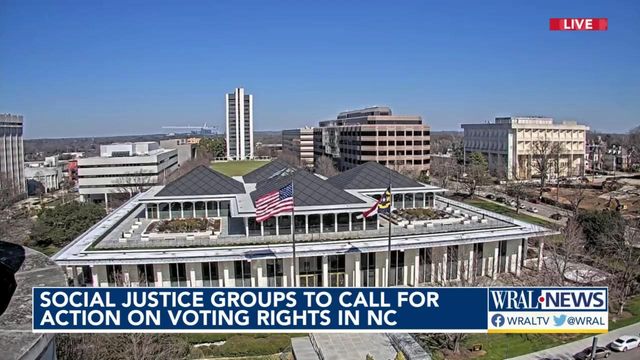NC Supreme Court had constitutional duty to strike down GOP maps, Democratic majority says in full opinion
The North Carolina Supreme Court's Democratic majority saw courts as the solution to partisan gerrymandering. Republican justices say they overstepped.
Posted — UpdatedNorth Carolina’s Democratic Supreme Court justices said they had a duty under the state constitution to prevent state lawmakers from implementing legislative and congressional boundaries drawn for pure partisan gain.
In a full opinion released Monday in a high-profile redistricting lawsuit, the high court's four liberal justices made the case against partisan gerrymandering and why they felt compelled to intervene in what their conservative colleagues viewed as judicial overreach.
Robin Hudson, a justice on the high court who will not seek reelection this year, wrote on behalf of her Democratic colleagues that the U.S. House, state House and state Senate maps Republicans approved in November 2021 violate the state constitution's free elections, equal protection, free speech clause and freedom of assembly clauses.
Hudson rejected the views of Republican attorneys and three conservative state Supreme Court justices who argued the high court was overstepping its authority.
“It is no answer to say that responsibility for addressing partisan gerrymandering is in the hands of the people, when they are represented by legislators who are able to entrench themselves by manipulating the very democratic process from which they derive their constitutional authority,” Hudson wrote. “Accordingly, the only way that partisan gerrymandering can be addressed is through the courts, the branch which has been tasked with authoritatively interpreting and enforcing the North Carolina Constitution.”
"We do not believe it prudent or necessary to, at this time, identify an exhaustive set of metrics or precise mathematical thresholds which conclusively demonstrate or disprove the existence of an unconstitutional partisan gerrymander,” Hudson wrote.
Chief Justice Paul Newby, writing for the three dissenting Republican justices, suggested that his colleagues in the majority were activists and went too far in their interpretation of the state constitution. They overstepped the boundaries of their expected role, he wrote. The reason, in his view: politics.
“With this decision, unguided by the constitutional text, four members of this Court become policymakers,” Newby wrote. “They wade into the political waters by mandating their approach to redistricting. They change the time-honored meaning of various portions of our constitution by inserting their interpretation to reach their desired outcome. They justify this activism because their understanding of certain constitutional provisions has ‘evolved over time.’”
“The majority says courts must protect constitutional rights. This is true,” he added. “Courts are not, however, to judicially amend the constitution to create those rights. As explicitly stated in our constitution, the people alone have the authority to alter our foundational document, and the people have the final say.”
The legislature can adjust the U.S. House maps for greater political advantage after the 2022 election. It remains to be seen whether state lawmakers could also retool state House and Senate maps ahead of the 2024 election and keep them in place for the remainder of the decade.
If the revised maps “fail to protect the constitutional rights of the people,” Hudson said the trial court may select maps by the process it deems best subject to the Supreme Court’s review. The lower court can elect to go with maps produced by plaintiffs in the case or an independent redistricting expert the trial court will soon appoint.
Attorneys for voting rights groups and Republican lawmakers then have until 5 p.m. on Feb. 21 to comment on the opposing sides’ maps. The panel must then select a map by noon on Feb. 23. Any emergency appeal of the trial court’s decision must be submitted by 5 p.m. on Feb. 23.
Candidate filing for the 2022 statewide primary and rescheduled municipal elections are scheduled to resume at 8 a.m. Feb. 24 and end at noon March 4.
• Credits
Copyright 2024 by Capitol Broadcasting Company. All rights reserved. This material may not be published, broadcast, rewritten or redistributed.






